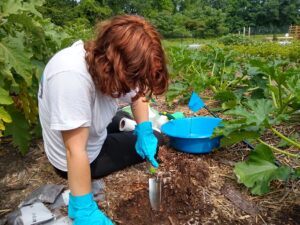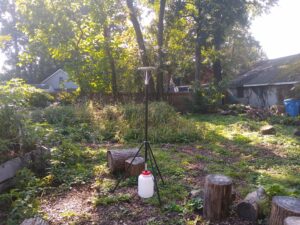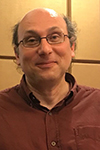Professor Engel-Di Mauro and Geography Student Marissa Trojan collaborate on National Science Foundation Project
Marissa Trojan ’23 (Geography), has partnered with Salvatore Engel-Di Mauro, professor of geography, on a National Science Foundation research project that examines for the presence of heavy metals in urban gardens.
The research project, titled “Examining Atmospheric and Soil Contamination in Urban Community Gardens,” runs through Summer ’22, and involves testing for the possibility of heavy metals including arsenic, cadmium, lead, mercury and nickel, present in the air, soil and rainwater of five key urban garden sites throughout Kingston. These urban gardens grow fruits and vegetables for self-provisioning and for sale or donation to the communities they serve. The results of this study would indicate whether and to what extent airborne dust and rain contribute to heavy metal contamination in urban gardens as well as how environmental impacts differ between urban gardens. Research locations include the following Kingston urban gardens: African burial site Harambee, a YMCA Farm Project garden, Rondout Gardens urban garden, and George Washington Elementary School urban garden.


In the first phase of the project, Trojan collected soil at each of the Kingston sites with Engel-Di Mauro. They collected 10 surface samples ranging from 5-10 cm in size, and an additional 10 deeper soil samples taken from the same sites. The samples are being analyzed by the results by the Environmental Sciences Analytical Center at CUNY Brooklyn College. Eventually, some testing will be done at the New Paltz Campus Soils Lab to compare results.
Additional phases of the project included the placement and monitoring of collection gauges set up at each urban garden site to collect rainwater and airborne particles for testing. Optimal gauge placement considered nearby buildings, trees and other overhanging features that might interfere with collection.
Once lab results from samples begin to come in, Trojan will map percentages of each heavy metal found at each site. Some possible influencers for heavy metal levels include the environment itself, the former uses of the site, proximity to vehicular traffic, pesticides, garbage and exposure to other human-made pollutants. Results will be shared with urban garden managers and, with their permission, made accessible to the general public.
Trojan, who serves as vice president of the campus Environmental Alliance Club, said the research, “satisfies a certain part of me that has always wanted to be creative with science – thinking of ideas and working out puzzles.” Future phases of the project include the creation of experimental garden plots as well as continued collection of soil, water and air samples from the current sites.


Trojan’s previous experience with fieldwork includes two weeklong sessions during the summers of 2019 and 2020 with The Institute Discovering Environmental Scientists (TIDES). This program teaches students the basics of fieldwork through hands-on experiments related to the Hudson River and local freshwater tidal wetlands. Trojan noted that fieldwork in the current climate can often be trying, requiring long days in the sun without the possibility of shade. While Engel-Di Mauro was conscientious about checking on Trojan’s hydration and energy levels while in the field, she anticipated that the larger issue of field work and climate change will need to be addressed as climate change continues to bring extreme climates to all areas of the globe. Recent regulatory and enforcement efforts by the Biden administration and OSHA regarding extreme heat encountered in the workplace opens a serious conversation about how to provide guidance and protections for both indoor and outdoor workers.
Trojan advised students to be open to participating in a campus research project. “I would recommend making relationships with your professors. It is the number one way to learn about opportunities. Participate in class and make yourself known (to your professors),” she said.
